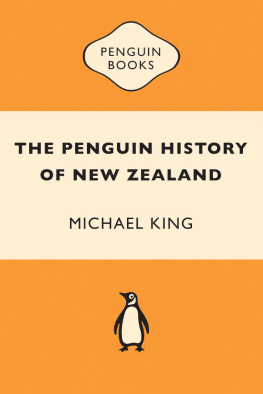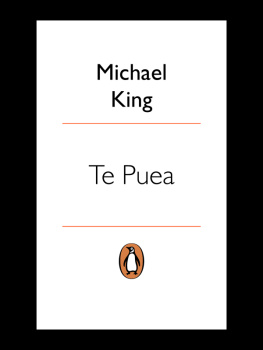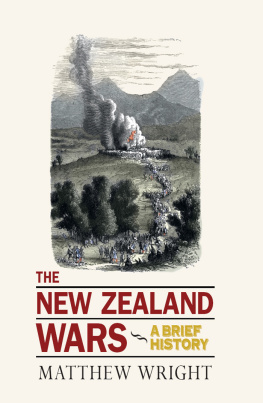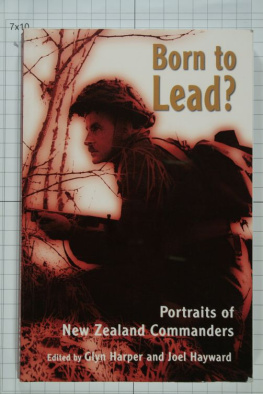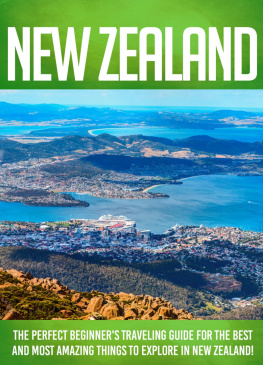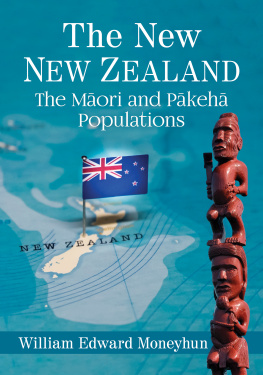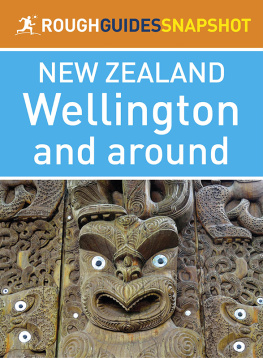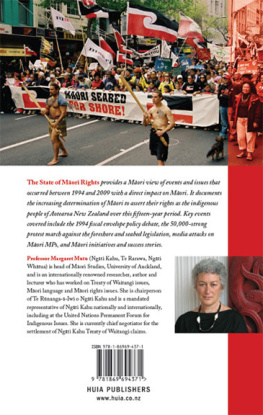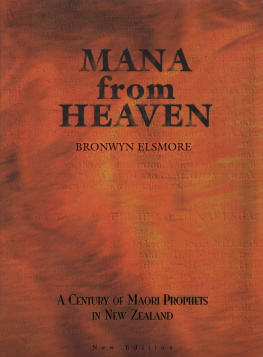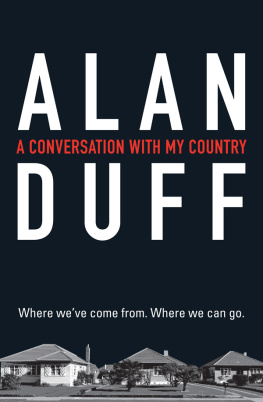The Penguin History of New Zealand
Michael King
PENGUIN BOOKS
Published by the Penguin Group
Penguin Group (NZ), 67 Apollo Drive, Rosedale, North Shore 0632, New Zealand (a division of Pearson New Zealand Ltd)
Penguin Group (USA) Inc., 375 Hudson Street, New York, New York 10014, USA
Penguin Group (Canada), 90 Eglinton Avenue East, Suite 700, Toronto, Ontario, M4P 2Y3, Canada (a division of Pearson Penguin Canada Inc.)
Penguin Books Ltd, 80 Strand, London, WC2R 0RL, England
Penguin Ireland, 25 St Stephens Green, Dublin 2, Ireland (a division of Penguin Books Ltd)
Penguin Group (Australia), 250 Camberwell Road, Camberwell, Victoria 3124, Australia (a division of Pearson Australia Group Pty Ltd)
Penguin Books India Pvt Ltd, 11, Community Centre, Panchsheel Park, New Delhi 110 017, India
Penguin Books (South Africa) (Pty) Ltd, 24 Sturdee Avenue, Rosebank, Johannesburg 2196, South Africa
Penguin Books Ltd, Registered Offices: 80 Strand, London, WC2R 0RL, England
First published by Penguin Group (NZ), 2003
Copyright Michael King 2003
The right of Michael King to be identified as the author of this work in terms of section 96 of the Copyright Act 1994 is hereby asserted.
Digital conversion by Pindar NZ
All rights reserved. Without limiting the rights under copyright reserved above, no part of this publication may be reproduced, stored in or introduced into a retrieval system, or transmitted, in any form or by any means (electronic, mechanical, photocopying, recording or otherwise), without the prior written permission of both the copyright owner and the above publisher of this book.
A catalogue record for this book is available from the National Library of New Zealand.
www.penguin.co.nz
ISBN 9781742288260
Contents
For
Lewis King
Spiro Zavos and
Peter Munz
Who fed and enlarged an appetite for history
Always to islanders danger
Is what comes over the sea
ALLEN CURNOW
A nation is bound together not by the past, but by the stories of the past that we tell one another in the present.
ERNEST RENAN
New Zealands fertile plains were the last that Europeans found before the Earths supply revealed itself as finite. Our relationship with them has been completely unsustainable [We] have exploited these islands richest ecosystems with all the violence that modern science and technology could summon [We] must live with the rest of nature or die with the rest of nature.
GEOFF PARK
Preface
New Zealand history sometimes seems extraordinarily compressed and close at hand. From the study in which I write, I look out on Maungaruawahine and Ruahiwihiwi, hilltop pa that still bear the imprint of the men and women of Ngati Hei, who fortied them. Over the range behind us is the sandbar where Roger Green discovered an East Polynesian pearl-shell lure, the only authenticated artefact that ancestors of the Maori brought with them from their island homelands in the Pacic. Up the inland end of our estuary is a wooden boom built in the days when kauri logs were oated down the valley for collection and transport to sawmills on the Waitemata.
Then there are the people. In my student days I knew Tom Seddon, born in 1884, who in childhood had enjoyed the company of his fathers friend George Grey. So I had shaken the hand of someone who had shaken the hand of Sir George Grey, Governor of New Zealand at the time of the Northern Wars. And Grey had shaken the hand of Hone Heke. Much later I knew Whina Cooper, whose father, Heremia Te Wake, had been born two years before the signing of the Treaty of Waitangi. These proximities gave me the feeling , if not quite the reality, that I was but one generation removed from the most momentous events of nineteenth-century New Zealand history; and that made those events seem all the more vivid and close to my own lifetime. Writing this book has conrmed that feeling.
A few words are in order, perhaps, to say what The Penguin History of New Zealand is and is not.
It is not an encyclopaedia that attempts to tell the story of every district and hamlet and to name every famous New Zealander from All Blacks to the rst European child born in Waipukurau. A compendium of those proportions is being assembled by the Ministry of Culture and Heritage for transmission alongside the ministrys online edition of The Dictionary of New Zealand Biography . It was not my intention to duplicate those ventures.
Instead, this volume provides an overview for understanding the unfolding of New Zealand history as a whole over the near-millennium that the country has been occupied by humankind. In particular it identies the myths that have shaped New Zealand cultures and provided them with cohesion and coherence. It examines too what happens when those myths are challenged. It reveals how societies are conditioned not so much by events as by group memories of events. And it conrms that the basic needs driving human history are the search for secure places in which to live, eat, shelter, reproduce and practise cultural or spiritual values.
It is currently fashionable to speak of the histories of a country, as if there are many versions of national history (which there are) and many ways of approaching such histories (which there are), and as if they were all of equal value and validity (which they are not ). This book is unashamedly a history of New Zealand in the sense that its narrative has been conceived by and passed through the mind and sensibility of a single historian, and in the sense that it identies some explanations the hows and whys of history as more plausible than others.
The text does, however, draw on a range of sources, Maori and Pakeha, male and female, privileged and unprivileged. And it draws on the work of fellow historians who have preceded me into the eld and into print. The most important of those sources and colleagues are named with respect and gratitude in the acknowledgements.
One further major point needs to be made. While I have relied often on the work of colleagues, this book is not written for other historians. Much of what I say and the manner in which I say it will be familiar terrain for professional peers. Instead, this volume is directed at curious and intelligent general readers, Maori and Pakeha, who are not historians. It focuses on things which such readers in the twenty-rst century ought to know and, perhaps, need to know about the history of their country. For this printing of the book, revisions have been made and new material added.
Michael King
Coromandel Peninsula
Part I: Prehistory
Chapter 1
A Land Without People
In Queen Charlotte Sound on 17 January 1770, Joseph Banks, naturalist on James Cooks rst expedition to the South Seas, caught a last vibration of primordial New Zealand a land where bush grew to the waters edge and trees were lled from ground level to canopy with copious bird and insect life:
This morn I was awakd by the singing of the birds ashore from whence we are distant not a quarter of a mile, the numbers of them were certainly very great who seemd to strain their throats with emulation [Their] voices were certainly the most melodious wild musick I have ever heard, almost imitating small bells but with the most tuneable silver sound imaginable.
For all its exuberance and beauty, one of Bankss successors would write, [that] dawn chorus was a mere echo of what could have been heard four hundred years before, for by 1770 around half of New Zealands bird species were already extinct. Gone were the great booming calls of the moa (which we know about from their convoluted, bony tracheas), the screaming, mewing and cawing of a billion seabirds (which even in Bankss day were banished from the main islands), and the unknowable sounds of the native ducks, giant geese, and yard-high ightless rails, native crows and giant harriers.

